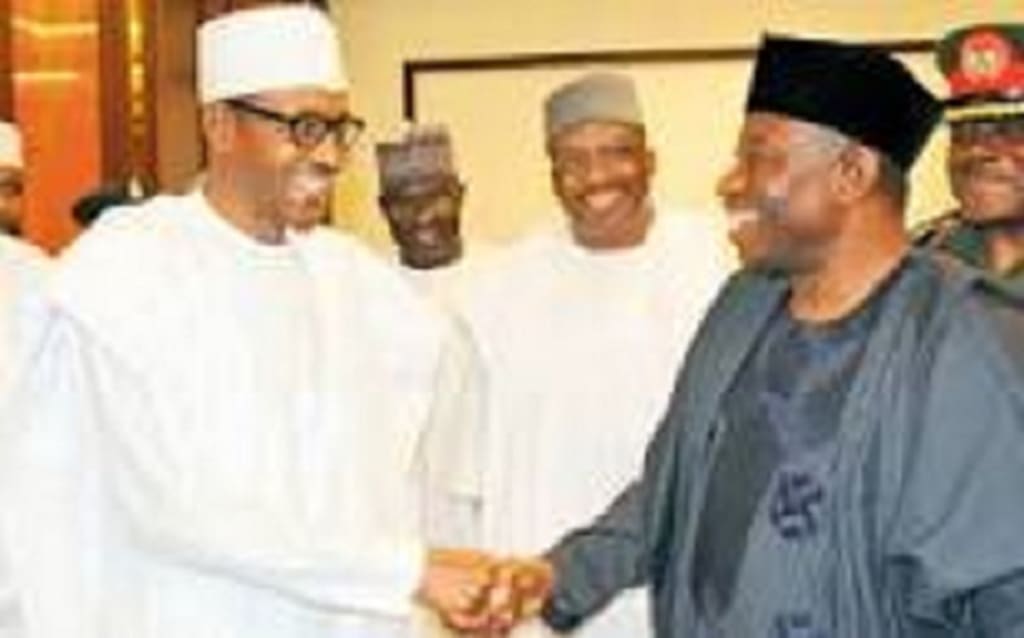A Tale of two Nigerian Administrations: a comparative analysis of Goodluck Jonathan's Tenure to Muhammadu Buhari's Rigime
An exploration of Governance, Economic Policies and Socio-Political impact

The governance of Nigeria has witnessed shifts in policies and leadership over the years, with two significant administrations that have shaped the nation's trajectory being that of Goodluck Jonathan and Muhammadu Buhari. Both leaders served as presidents during crucial periods in Nigeria's history, facing unique challenges and opportunities that shaped their respective tenures. This comparative analysis delves into key aspects of their administrations, with a primary focus on economic performance, governance, and socio-political impact.
Economic Performance:
Goodluck Jonathan's Tenure (2010-2015):
Goodluck Jonathan's tenure began during a time of relative economic stability, with Nigeria experiencing steady GDP growth rates of around 5% annually. During this period, the country's economy expanded beyond oil, with sectors like telecommunications, banking, and entertainment flourishing. His administration took steps to promote foreign investment, fostered a business-friendly environment, and initiated programs aimed at poverty alleviation and job creation.
The growth during Jonathan's tenure was partly supported by favorable oil prices, which contributed significantly to government revenue. However, critics argued that the administration didn't do enough to diversify the economy further and reduce dependence on oil. Additionally, corruption and mismanagement were persistent issues that drew criticism, despite notable economic achievements.
Muhammadu Buhari's Regime (2015-2023):
Muhammadu Buhari's administration faced a different economic landscape, with challenges that included a sharp decline in oil prices during its early years. This situation exposed Nigeria's overreliance on oil exports and underscored the need for economic diversification. Buhari's government initiated reforms to encourage investment in non-oil sectors, such as agriculture and manufacturing, to reduce the vulnerability to oil price fluctuations.
The first term of Buhari's administration witnessed some economic setbacks, including recession in 2016. However, his second term showed signs of improvement, with a gradual recovery and a return to positive GDP growth rates. Despite these efforts, critics argued that the pace of economic diversification was slow, and there were concerns about the business environment's attractiveness to foreign investors.
Governance and Socio-Political Impact:
Goodluck Jonathan's Tenure (2010-2015):
Jonathan's administration made strides in certain aspects of governance, such as electoral reforms and advancements in technology for voter registration and result collation. He was praised for overseeing a peaceful transition of power after losing the 2015 elections, which set a positive precedent for democratic stability in Nigeria.
However, his presidency was marred by controversies surrounding corruption allegations and slow responses to security challenges. The government's handling of the Boko Haram insurgency was widely criticized, and it raised concerns about the safety and security of Nigerian citizens.
Muhammadu Buhari's Regime (2015-2023):
Buhari's administration placed a strong emphasis on anti-corruption efforts, launching initiatives aimed at recovering stolen funds and holding corrupt officials accountable. While these efforts received support from some quarters, critics argued that the anti-corruption drive was selective and lacked systemic reforms to address the root causes of corruption.
Buhari's presidency also faced significant security challenges, particularly regarding the Boko Haram insurgency and the emergence of other armed groups in different regions. Efforts to tackle these security threats were met with mixed results, with instances of both success and setbacks.
Contrast and Verdict:
The comparison between the two administrations reveals that both Goodluck Jonathan and Muhammadu Buhari faced unique circumstances and challenges during their tenures. Jonathan's administration experienced more favorable economic conditions, but criticisms were raised about corruption and inefficient resource management. On the other hand, Buhari's regime confronted economic headwinds, yet it demonstrated efforts to diversify the economy and combat corruption.
A convincing point in favor of Muhammadu Buhari's regime lies in its response to economic challenges. The administration recognized the need for economic diversification and took steps to promote non-oil sectors, showing resilience and determination in the face of adverse economic conditions. Additionally, the emphasis on anti-corruption efforts, despite criticism, represents an essential commitment to combating corruption, a long-standing issue in Nigeria.
It is important to acknowledge that both administrations had their strengths and weaknesses. Evaluating which one is "best" depends on individual perspectives and priorities. Goodluck Jonathan's tenure saw more favorable economic growth, while Muhammadu Buhari's regime demonstrated resilience and a commitment to addressing corruption and economic diversification. In the long term, the impact of their policies and actions will continue to shape Nigeria's trajectory, making it essential to observe the developments and outcomes beyond their respective tenures.





Comments
There are no comments for this story
Be the first to respond and start the conversation.